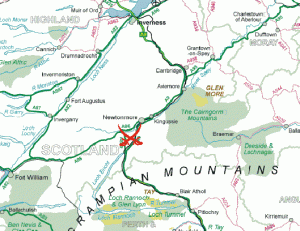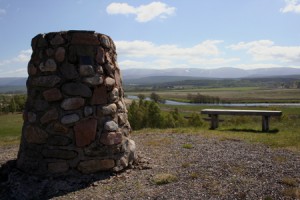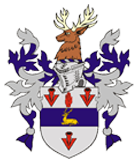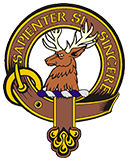Battles of Invernhaven And Perth – 1300s

Invernahavon in Glen Spey
Dealing with the “Ghosts of the Past” – The Battle of Invernahavon
Let’s rewind the clock several years prior to 1396, and travel to a possible launching point: the Battle of Invernahavon (most likely ca. 1380). Most accounts of the North Inch battle concerning the Davidsons point to the conflict at Invernahavon and its preceding tensions as the instigators of the feud. Most scholars find little fault in the accepted account of that battle, wherein we find the Clan Cameron encroaching (read this as “squatting”) on Chattan (specifically Davidson) lands, yet refusing to pay rent. Some accounts add to that the thieving of Davidson cattle and other offenses committed during their occupation. In any event, the result was the Davidson Chief seeking aid from The MacIntosh6, Chief of the Confederation [Note: Often a Clan’s Chief is referred to as “The MacIntosh” or “The MacMillan” with the “the” being capitalized to connote that the MacIntosh which is being indicated is, in fact, the Chief of the Clan. Alternatively, some Clan Chiefs may also be identified by the term “MacIntosh of That Ilk”. Sennachie]. A portion of Clan Chattan confronted the Camerons at Invernahavon in an attempt to remove them, but at the outset of the conflict, an argument broke out between The Davidson and The MacPherson as to whose was the senior cadet clan and, therefore, had claim to the “right wing7 ” in the battle. The MacIntosh/Chattan Chief selected the Davidsons (well, naturally), and this so insulted the MacPhersons that they withdrew from the conflict. As a result of the loss in numbers, Chattan were outmatched and routed by the Camerons. In the night, MacIntosh sent his bard to the encamped MacPhersons with a song describing the cowardly misdeeds of those who abandon their friends in time of need. Ashamed and enraged (as we Scots are so accepting of our honor being challenged), the MacPhersons attacked the Camerons the same hour, slaughtering them in their sleep.

Invernahavon
Alright, so the scholars agree that this history, although sometimes seen with minor variations, is correct. We can assume, therefore, that the evidence, in whatever form, is available to back it; no real problems there. Yet, it remains unclear what this conflict has to do with the Battle of the North Inch, occurring over ten years later. Why did we end up being participants? What happened to warrant governmental adjudication at the highest level? The actual causality behind any historic event is generally a question for the ages, and can be quite subjective even when there is written documentation. Events between the battle at Invernahavon and the Battle of the North Inch, however, are all but absent from the history books, and when information is found it is hazy at best, leaving even more room for subjectivity. So, the “why” of the argument is a question mark that is very hard to ignore. To bridge the gaps in the timeline, theories and speculations – many of which contain elements described by Scott – have been asserted, but the level of discrepancy between takes and the ensuing confusion is substantial. In fact, the only agreement between any two versions seems to be the overall setting of the North Inch battle, which offers little in the way of explanation for our involvement. Further, when we examine any history where there appears to be a bit of “wiggle room” for the facts, there is usually more than one complication. Our story is no exception.

